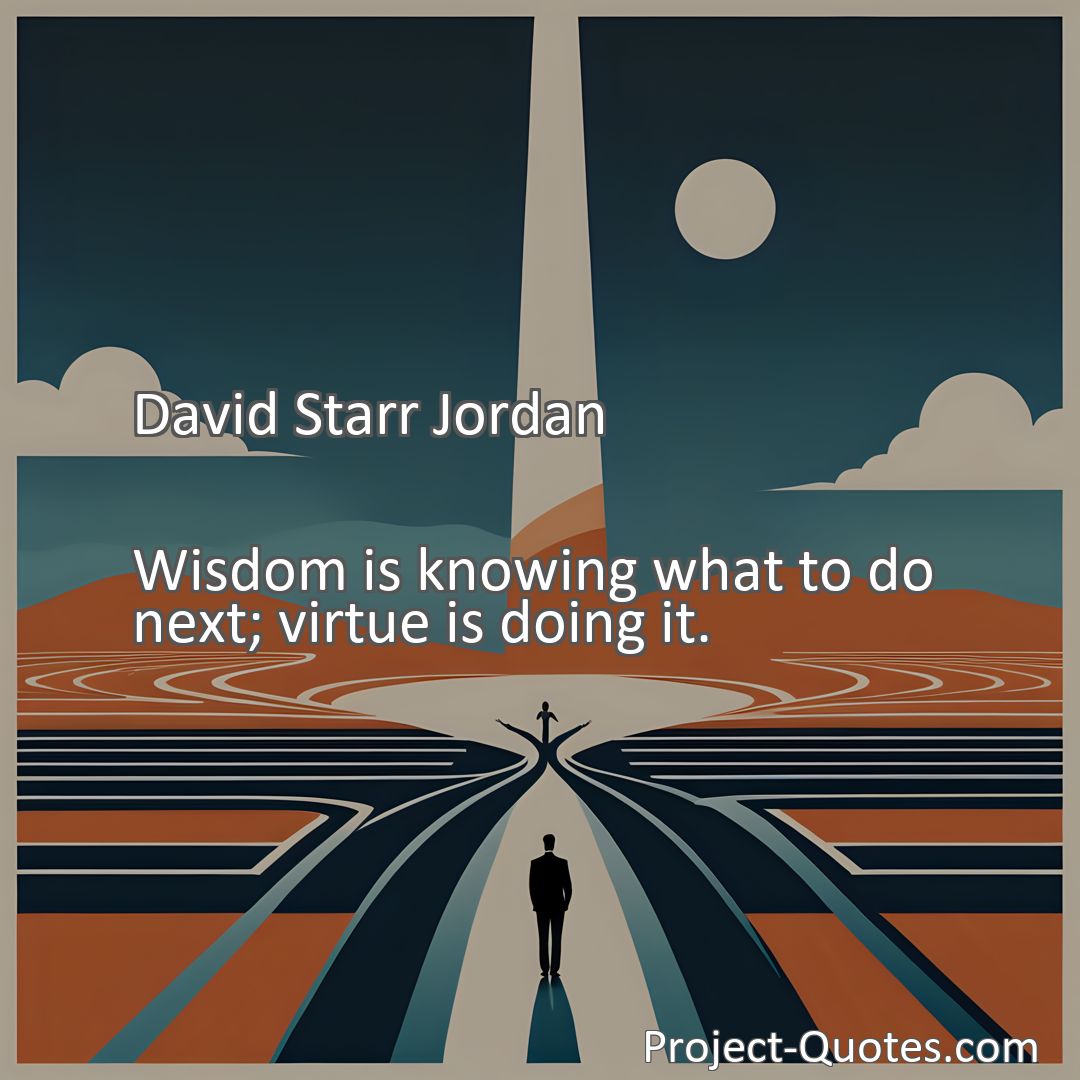Wisdom is knowing what to do next; virtue is doing it.
David Starr Jordan
The Importance of Wisdom and Virtue: Guiding Lights for Smart Decisions and Moral ActionsWisdom and virtue are two qualities that can greatly contribute to a person’s character and success in life. Wisdom serves as a compass, helping individuals navigate through life’s challenges and dilemmas, while virtue requires individuals to act in accordance with moral principles and values. Together, the integration of wisdom and virtue creates a harmonious balance that leads to personal growth, positive relationships, and a more ethical society.
Table of Contents
Meaning of Quote – Wisdom is knowing what to do next; virtue is doing it.
Wisdom and virtue are two qualities that can greatly contribute to a person’s character and success in life. While wisdom can be defined as having knowledge and understanding, virtue refers to the moral excellence and goodness displayed through one’s actions. Together, these two qualities can guide individuals in making the right choices and behaving morally.
Wisdom serves as a compass, helping individuals navigate through life’s challenges and dilemmas. It involves more than just knowing what to do; it encompasses critical thinking, rational decision-making, and experience-based insights. In a world filled with constant change and uncertainties, wisdom allows individuals to adapt, grow, and make informed choices.
However, wisdom alone is not sufficient. It is through the embodiment of virtue that wisdom is given purpose and meaning. Virtue requires individuals to act in accordance with moral principles and values. It involves putting knowledge into action, doing what is right, regardless of personal gain or convenience. Virtuous individuals possess a strength of character that influences their behaviors and choices positively, inspiring others to do the same.
The integration of wisdom and virtue can be particularly beneficial during times of adversity. When faced with difficult decisions or challenging situations, individuals with both wisdom and virtue are more likely to demonstrate resilience and integrity. Their decision-making process is guided not only by logical thinking but also by a deep-rooted sense of doing what is morally right.
Consider the following scenario: a student finds a lost wallet on the school grounds during lunchtime. Wisdom allows this student to recognize the importance of the situation and to assess the available options. They could pocket the money, ignore the wallet, or report it to the lost and found. However, it is the virtue that guides them in taking the morally responsible action. They make the honorable choice to return the lost wallet to its rightful owner, understanding that it is the right thing to do, even if it may not offer personal benefits.
In addition to personal growth and ethical decision-making, the integration of wisdom and virtue also plays a significant role in fostering positive relationships, both at school and in society. When individuals possess wisdom, they cultivate empathy, tolerance, and understanding. They can approach conflicts with a broader perspective, considering the feelings and thoughts of others. Combined with virtue, individuals treat others with respect, kindness, and fairness, promoting a harmonious and inclusive environment.
A wise and virtuous person serves as a role model for others, inspiring them to adopt similar qualities. By consistently exemplifying wisdom and virtue through their actions, they can positively influence those around them, encouraging others to also prioritize knowledge, ethical behavior, and personal growth. This ripple effect can create a collective culture that values wisdom and virtue, benefiting the whole community.
Moreover, wisdom and virtue are interconnected, as one often leads to the other. Wisdom is enhanced through the practice of virtue, and the exercise of virtue is fortified by the application of wisdom. As individuals consistently choose to act virtuously, they gain richer experiences and learn valuable lessons. These experiences then contribute to the development of wisdom, enabling individuals to make even wiser decisions in the future.
It is worth noting that the journey towards wisdom and virtue is not without challenges. It requires self-reflection, a willingness to learn from mistakes, and the courage to make difficult choices. Individuals may face temptations that challenge their integrity or moments when it may seem easier to compromise their principles. However, by continuously nurturing wisdom and virtue, individuals can build a strong moral foundation that will guide them through life while staying true to their values.
In conclusion, wisdom and virtue are powerful traits that, when combined, enable individuals to make smart, thoughtful decisions and act morally. Wisdom serves as the guiding light, granting individuals the knowledge and understanding to make informed choices. However, it is virtue that truly empowers individuals to take action based on moral principles, exhibiting qualities such as honesty, kindness, and justice. Together, wisdom and virtue create a harmonious balance that leads to personal growth, positive relationships, and a more ethical society.
I hope this quote inspired image brings you hope and peace. Share it with someone who needs it today!


